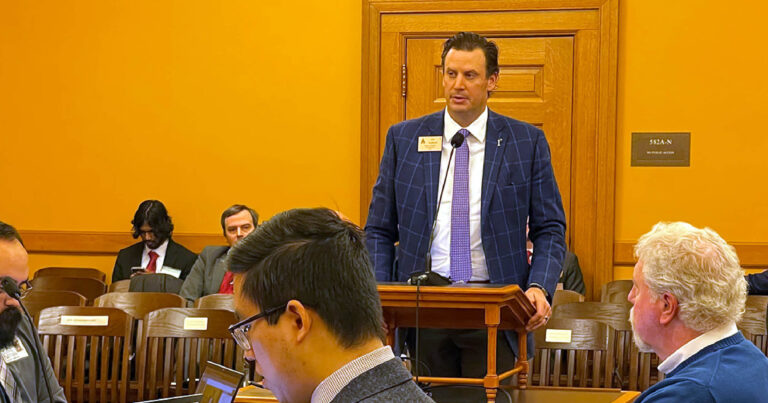by Elizabeth Walters
Kansans pay sales tax on nearly every purchase they make in a store, at a restaurant or online. It is the responsibility of the retailer, business owner, or restaurant manager to collect the sales tax and then submit it to the State of Kansas. It is a transaction that cost time and money.
Corey Peterson, president & owner of Hemslöjd, Inc., explained that there’s a lack of compensation for retailers “serving as defacto agents” of the state, county and city governments.
“There are real costs involved in providing this service, both in time and money,” Peterson explained. “The most obvious and direct expense are credit card fees. We pay credit card processing fees for transactions, including the sales tax collected. Over 85% of our sales are paid with credit cards. This means that our company pays, out of pocket, a fee of 2-4% for over 85% of all sales tax dollars collected. This is in addition to the bookkeeping expenses related to the collection, reporting and remitting of the taxes.”
The Kansas Chamber recently introduced Kansas Senate Bill 41, seeking tax reimbursement credit for Kansas retailers. The bill would compensate businesses up to 1.5% of the total dollars remitted to the state.
Eric Stafford, the Chamber’s vice president of government affairs, represented the Kansas Retail Council (KCR), introducing the bill at the Kansas Senate Committee on Assessment and Taxation.
“To help offset that cost associated with being the state’s tax agents and collecting sales tax for the state, we have introduced Senate Bill 41 to reimburse retailers a percentage up to one and a half percent of their sales tax collected, but no more than $300 a month, or $3,600 a year,” Stafford said. “$3,600 isn’t going to mean a lot to the larger retailers, but it means a lot to the smaller ones.”
Stafford noted that business owners are obligated to distribute a large amount of sale taxes to the state —a process that can require expensive software to calculate accurately. The KRC has asked the Legislature to acknowledge the role private industry plays in serving as the state’s tax agent and support policies that help businesses offset software and other costs associated with compliance.
The KRC includes a variety of businesses, from corporate chains to independent mom and pops. While the KCR recognizes the difficult tax process for retailers operating in multiple states, Senate Bill 41 specifically aims to alleviate operation costs for small businesses.
“The Kansas Chamber represents small, medium and large businesses of all industry segments across the state,” Stafford explained. “That includes the 6-employee retail shop where it’s the owner doing all the compliance and paying for all the software and thinking ‘how do I manage everything that I’m required to do for the state?’”
Tax reimbursement for retailers is not unprecedented. If Senate Bill 41 passes, Kansas will follow in the footsteps of 27 other states with similar legislation.
“How state’s handle this credit varies greatly, but most offer a fixed dollar maximum either per month or annually,” Stafford said. “For example, Alabama has a $400/month max and has a 5% rate on the first $100 but 2% on anything over $100. Arizona has a 1% credit capped at $10,000 annually.”
As outlined in the Kansas Chamber’s 2023 Legislative and Policy Agenda, the KRC will advocate for several bills this legislative session that will significantly impact retailers. Read more about the KRC’s top legislative priorities here.
No one spoke in opposition of the bill.
UPDATE: On Feb. 16, the Committee on Assessment and Taxation submitted a report recommending the bill be passed.



